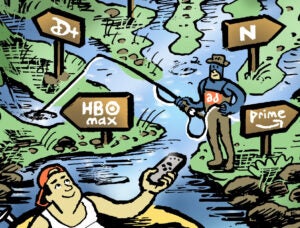 Here’s today’s AdExchanger.com news round-up… Want it by email? Sign-up here.
Here’s today’s AdExchanger.com news round-up… Want it by email? Sign-up here.
The Slipping Screen
Is upfront ad selling on the way out? Hard to say, but it’s not as lucrative as it used to be, and there is a general sense of doom and gloom among TV broadcasters as ratings decline and audiences find other channels to get their viewing on. But it’s hard to pinpoint just how bad it is, The Wall Street Journal points out, because there’s not a lot of transparency in the process. Still, big brands like McDonald’s, Verizon Wireless (supposedly reducing its budget by double digits) and State Farm are cutting back in a major way. Analysts seem to be circling around a 5-10% drop-off in TV advertising this year, to the benefit of online video and other digital channels. Additionally, advertisers are holding their wallets closed in order to have more TV buying flexibility as program air dates loom. Read on.
Netflix’s Road Map
Speaking at MediaPost’s OMMA Programmatic Display conference, Netflix’s global director of programmatic marketplace and channel development, Kathy O’Dowd, says the platform sees the potential in programmatic to target viewers at scale. “We are moving to programmatic, in part, because it is so efficient,” she said. “We can be more individualised in the kind of marketing that we’re doing, and that’s ultimately … every advertiser’s dream.” Online video viewing habits can betray a lot of insight into a user’s interests, and Netflix hopes to tap into its trove of user data to inform its push into programmatic. But in the short term, Netflix’s main goal is to expand its user base, O’Dowd said. Warc has more.
Face The Facts
Marketers, including some from industry leaders like M&C Saatchi and Ogilvy, are developing tools that read and code facial gestures as a way to gauge users’ reactions to marketing content. For now, the technology is being used primarily in the creative-testing process and is thought to be more reliable than traditional focus groups. However, some retailers have begun deploying cameras in stores that have similar capabilities, and if phones someday onboarded the tech, it could lead to a whole new realm of marketing data and opportunity. Or, at worst, a chance to really freak out consumers. More via The Drum.
Nordic Programmatic
Programmatic advertising is picking up in Norway, eMarketer reports. According to June research from Nordic RTB buyer Delta Projects, programmatic ad spend has increased 212% in the country in the past year and accounted for 12% of total digital display spend last year. And according to Peter Karlsson, the country manager of Delta Projects Norway, “In 2015, non-RTB programmatic trading will be the main factor driving continued growth in the market.” eMarketer projects that digital display ad spend in Norway will grow 10.3% in 2015 to reach $401.7 million. Read on.
Driving Sales
Automotive lead-generation company TrueCar and AutoNation, the country’s largest new-car retailer, parted ways over a dispute regarding data rights. Simply put: TrueCar wants more data from AutoNation about transactions. AutoNation CEO Mike Jackson: “Over my dead body.” But this disagreement is not about customer privacy concerns as much as it is about attribution. AutoNation said TrueCar was responsible for 3% of its sales. TrueCar begs to differ with that tally, claiming 7%. It simply wants the data to perform an accurate audit! But there’s another issue at play, according to AutoNation: TrueCar is emerging as a competitor. “[TrueCar is] going to inject themselves into the arrangement of financing, they’re going to have a service product, they’re going to have a trade-in product,” said Jackson. “So they’re going for the entire spectrum of the auto retail business.” Read more at Ad Age.
Getting The Algorithms We Deserve
Researchers from the Wharton School have released a report titled “Overcoming Algorithm Aversion: People Will Use Algorithms If They Can (Even Slightly) Modify Them.” The paper gets into a cruel irony that plagues many on the marketing and tech side: why evidence-based algorithms that “consistently outperform human forecasters” are just as consistently abandoned by users. The research finds that giving users even a small degree of control over the algorithm results in higher satisfaction and toleration of errors. Get the report.
You’re Hired!
- Former Outbrain CRO Tom Foran Joins Yieldmo As President & COO – press release
- Former Apple Exec Winston Crawford Is Drawbridge’s New COO – The WSJ
- TiVo Names Frank Foster Head Of Its Research/Analytics Unit – Multichannel
But Wait, There’s More!
- P&G’s Brand Exits Are Another Headache For Madison Avenue – The WSJ
- Facebook’s Security Chief Calls For Adobe Flash To Be Killed Off – HotForSecurity
- Comcast Sells A Cord-Cutting Service, Which Requires Comcast’s Cord – Re/code
- Apax To Acquire Online Retailer RFS Holland For $499 Million – RBR
- A Mid-Year Check-In On 2015 Marketing Predictions – MediaPost
- From Data-Informed To Fully Addressable – Beet.TV
- Addicted To Your Phone? There’s Help for That – The NYT
- AdYapper Raises $4.5M – press release
- nToggle Announces Formation of Product Advisory Board – nToggle blog
- Report: Sophisticated Email Segmentation Boosts Open Rates And Engagement – Mobile Commerce Daily












